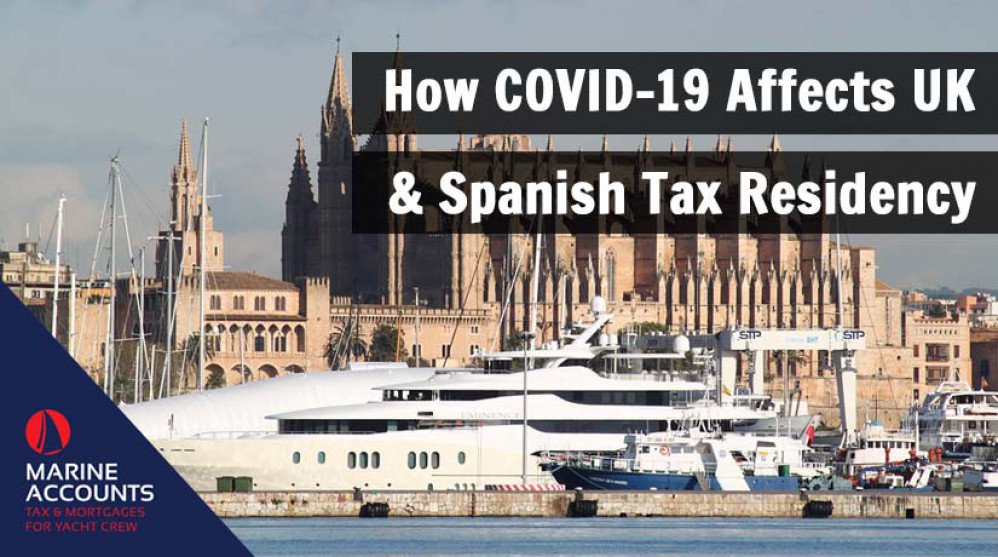How COVID-19 Affects UK & Spanish Tax Residency
- Authors
-
-

- Name
- Patrick Maflin
-

Image source: https://pixabay.com/photos/palma-de-mallorca-cathedral-palma-273643/
With many crew now spending extended periods either at home or in one specific location with travel restrictions due to COVID-19, the issue of tax residency will once again rear its ugly head.
This should be one of the important issues you look to gain an understanding of in these unprecedented times.
Whilst there are many situations where government's worldwide are allowing special dispensations, tax residency testing is not one of them.
The qualifying criteria remain unchanged.
Each location will apply their own tests to your individual situation.
In this article, we'll explain some of those we're being asked about most often.
Beginning with the UK and the Seafarer's Earnings Deduction (SED) and then the Spanish system of testing.
Read on to find out more or click a jump menu below to skip to a chapter of your choice.
Chapters
- United Kingdom and 100% Tax Exemption
- Continuing to Qualify
- Breaking Your Qualifying Period
- Spanish Tax Residency Testing System
- Spanish Tax Residency Tests
- What To Do If You're Spanish Tax Resident?
- Speak to Us or Comment!

Image source: https://pixabay.com/photos/flag-union-jack-union-british-2405962/
United Kingdom and 100% Tax Exemption
For UK tax residents, we're happy to report that the deduction available to you will remain in place and your income may still qualify to be declared with no tax to pay.
However, with extended periods at home putting the qualifying periods of many at risk, you need to be sure you understand how to continue to qualify and how to manage the situation if your qualifying period is broken.
Continuing to Qualify
HMRC will apply the following test to your situation in order for you to continue to:
- Spend more than 183 days outside the UK in any given 365-day period
- Be considered an employee as opposed to self employed
- Be engaged onboard a self-propelled and foreign going vessel
Note: The Half Day Rule
You may continue to qualify if you spend more than 183 days in the UK this year, as long as those 183 days are not consecutive and you've spent more than half your time outside the UK since you first made a claim.
So, now you are armed with a good understanding of how your qualification continues, you may need to understand what to do if this is not the case.
Breaking Your Qualifying Period
The most obvious way in which previously qualified crew members will break their qualification under current restrictions is by spending more than 183 consecutive days in the UK.
Without the option to leave, or through lack of a job to go back to, it’s sad to see how this could happen.
If you do find yourself in this situation, we'll be happy to offer free advice over the phone but for now, there’s two important items for you to note.
Firstly, any payments you receive after the first UK day of those 183 will become taxable.
When you do eventually have the opportunity to return to work, you will then need to begin a new qualifying period by spending 183 days outside the UK in the first 365 days, and also ensuring you are outside the UK on the 365th day of that initial period.

Image source: https://www.pexels.com/photo/spain-flag-in-pole-54097/
Spanish Tax Residency Testing System
With the UK covered, it's now time to look at the Spanish system of tax residency.
As before, the residency tests applied by the Spanish tax authorities will not change.
Unfortunately unlike the UK, the Spanish authorities don’t offer a tax deduction for yacht crew, making it all the more important that you understand whether or not you’ve met their criteria for residency.
Spanish Tax Residency Tests
With no allowance made for the unusual circumstances many people are currently finding themselves in, the Spanish authorities will be applying the following 3 tests to your circumstances:
- The 183-Day Test: Under this test you will be ruled to be a Spanish tax resident if you spend more than 183 days in Spain in a calendar year. If this is the case, you will automatically be ruled as a Spanish tax resident.
- Centre of Vital Interests: if the majority of your social and personal interests are based in Spain, then you will automatically be ruled a Spanish tax resident. Under this test, the authorities may look to build a case based upon your residential address being in Spain. It’s important to remember that if you’ve taken a rental property for the period of restrictions, this may make you a Spanish tax resident. Other factors could include having family based in Spain or being registered as a Spanish resident permanently.
- Center of Economic Interests: The final test applied could be crucial to your circumstances if you’ve been based in Mallorca, or elsewhere in Spain for the last few months, and continued to receive payments for your work. If you’ve received more money for your work in the 2020 calendar year whilst you’ve been based in Spain than you have whilst based outside the country, the authorities may have a case for your Spanish tax residency.
What To Do If You're Spanish Tax Resident?
Whilst you may be able to take some understanding of the circumstances based on the information above, it would certainly be advisable to take professional advice as the tests described will be applied on an individual basis.
Results of any court case can certainly be unpredictable.
Speak to Us or Comment!
If you’re potentially affected or concerned by tax residency complications in the UK, Spain or elsewhere, don’t hesitate to contact our experts for advice. Get in touch with us today or let us know your thoughts in the comments section below.
Liked this article? Try reading:
Spanish Residencia & Spanish Tax Residency - Can You Have One Without the Other?
Any advice in this publication is not intended or written by Marine Accounts to be used by a client or entity for the purpose of (i) avoiding penalties that may be imposed on any taxpayer or (ii) promoting, marketing or recommending to another party matters herein.


